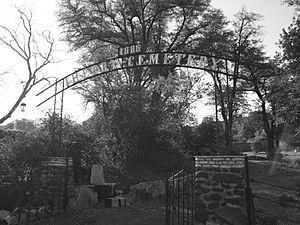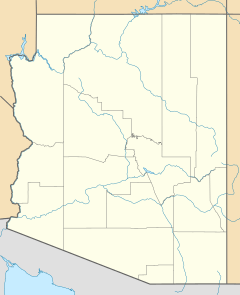Cherry, Arizona facts for kids
Quick facts for kids
Cherry, Arizona
|
|
|---|---|

Cherry cemetery, est. 1886
|
|
| Country | United States |
| State | Arizona |
| County | Yavapai |
| Elevation | 5,143 ft (1,568 m) |
| Time zone | UTC-7 (Mountain (MST)) |
Cherry is a fascinating ghost town located in the middle of Yavapai County, Arizona. It sits high up at about 5,143 feet (1,567.6 meters) above sea level, nestled between the towns of Dewey and Camp Verde. Once a busy mining town, Cherry is now a quiet place where you can still see hints of its past.
Contents
The Story of Cherry, Arizona
Cherry was once a lively place, especially for those looking for valuable minerals. Its official post office opened on March 3, 1884. This meant it was a recognized community where people could send and receive mail. The post office served the town for many years, finally closing its doors on March 15, 1943.
What Made Cherry Important?
Cherry was important because of its rich mining areas. Many mines operated nearby, digging for different minerals. Some of the most well-known mines in the area included the Federal, Bunker, Sunnybrook, Logan, and Gold Bullion mines. These mines brought many people to Cherry, hoping to find their fortune.
Who Lived in Cherry?
During its busiest time, Cherry was home to about 400 people. These residents lived and worked in the town, supporting the mining operations and local businesses. It was a bustling community, full of life and activity, all centered around the mining industry.
What is Cherry Like Today?
Today, Cherry is no longer a busy mining town. Instead, it has become a small community where people go to retire or enjoy a quiet vacation. Even though it's much quieter now, many of the original buildings from its mining days are still standing and are even being used. These old buildings help tell the story of Cherry's past.
Exploring Cherry's Old Cemetery
One of the most interesting places to visit in Cherry is its old cemetery. This cemetery holds the graves of many people who lived in Cherry during the late 1800s and early 1900s. Walking through the cemetery gives you a glimpse into the lives of the early settlers and miners who called Cherry home.
 | William Lucy |
 | Charles Hayes |
 | Cleveland Robinson |



